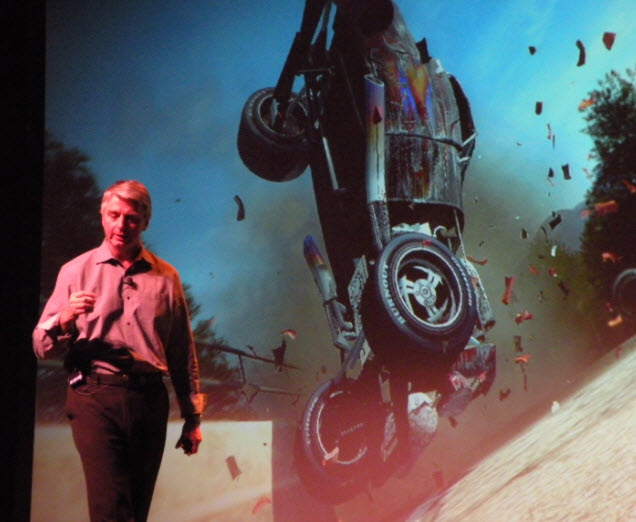 Electronic Arts has just had to cut 1,100 of its 10,000 employees. John Riccitiello, chief executive of EA, talked at the Dice Summit today in Las Vegas about how the company is dealing with that and about its strategy to survive in the recession.
Electronic Arts has just had to cut 1,100 of its 10,000 employees. John Riccitiello, chief executive of EA, talked at the Dice Summit today in Las Vegas about how the company is dealing with that and about its strategy to survive in the recession.
It’s hard to talk about innovation, Riccitiello said, when you’re hearing negative economic news on a daily basis that’s equivalent to a once-in-a-century event such as landing a man on the moon.
Riccitiello spoke at the Dice summit last year and he’s good at straight talk. He said that accountants will tell you to cut from the bottom, but that EA tried to cut fairly and smartly from the top to the bottom. His advice? Decide what’s important. Invest in that. Cut the rest. That means developers should focus on quality, not quantity.
“You can’t save your way to success,” he said.
He said that EA decided it would continue to invest in its most important sequels, such as the Madden football game. Then the EA team decided on what original new game ideas it was most enthusiastic about and plans to continue investing in those titles. The company then looked at new business models that change games from a one-time retail sale to a service that reaps subscription revenues or other ongoing revenue streams, and then decided which experiments it needs to keep going. Everything else, he said, was cut.
He said the game industry is still growing, including a 13 percent bump in January, but that the industry’s costs are growing faster than revenues, which is why so many game studios are being shut down now.
Riccitiello acknowledged it was painful to cut a lot of things and that it may be harder to experiment. He said it was a mistake to invest $150 million in direct-to-consumer digital distribution in 2008, which was hurt by the downturn. He said another blow was Mirror’s Edge, which won critical acclaim but didn’t sell as expected. That was a bet he said he felt good about making, given the need to create new game franchises.
 Mirror’s Edge was a game where the protagonist, a female messenger in a future police state, didn’t shoot anyone and instead tried to evade the police by jumping from skyscraper to skyscraper. It was very original, but the EA studio that made the game, DICE of Stockholm, Sweden, debated whether it should make the game into a customary shooting game. It made a big bet, and it didn’t turn out so well.
Mirror’s Edge was a game where the protagonist, a female messenger in a future police state, didn’t shoot anyone and instead tried to evade the police by jumping from skyscraper to skyscraper. It was very original, but the EA studio that made the game, DICE of Stockholm, Sweden, debated whether it should make the game into a customary shooting game. It made a big bet, and it didn’t turn out so well.
EA has also had to make hard decisions about shifting jobs to low-cost areas that allow the company to keep working on titles it otherwise wouldn’t be able to afford. He also said that EA is open to partnering on technology with outsiders and working through virtual organizations, so that its headcount doesn’t keep growing.
EA grew 18 percent in 2008, but it had planned to grow almost double that. It had big problems during the Christmas quarter and the economy didn’t help. But internally, he said, the company was fat in too many places and that was slowing it down.
One thing he learned from Apple’s iPhone is that there’s tremendous appetite for games that are distributed digitally and played in small chunks of time for the cost of about a dollar. He said EA needs to be able to build games for this channel for $100,000, not $2 million.
As for what games we’ll see EA focusing on, Riccitiello said EA will publish a new version of American McGee’s Alice, a new version of DeadSpace, DeadSpace Extraction, id Software’s Rage, Brutal Legend from Double Fine Productions, and new titles from BioWare. He noted that PC gaming is a growth business, but it doesn’t show up in retail sales reports from NPD because it doesn’t capture online game revenue. The online game industry is exploding in places like Korea and China, he said.
Riccitiello closed by saying that the downturn is a blessing for the game industry because a “lot of the riff-raff will go bankrupt” and the industry had gotten too fat. Now it has the opportunity to focus on the best opportunities.
“I’m not pro-recession, but never waste a crisis,” he said.
After the speech, Greg Zeschuk, the co-chief of EA’s BioWare studio, said that Riccitiello’s strategy made sense. (He has to say that). And he noted that focusing on what you do best is a natural part of any business strategy.



